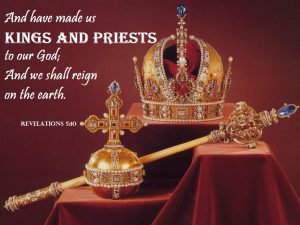
Shownotes
Welcome to Day 1526 of our Wisdom-Trek, and thank you for joining me.
I am Guthrie Chamberlain, Your Guide to Wisdom
Once and Future Kings – Worldview Wednesday
Wisdom - the final frontier to true knowledge. Welcome to Wisdom-Trek! Where our mission is to create a legacy of wisdom, to seek out discernment and insights, to boldly grow where few have chosen to grow before. Hello, my friend; I am Guthrie Chamberlain, your captain on our journey to increase Wisdom and Create a Living Legacy. Thank you for joining us today as we explore wisdom on our 2nd millennium of podcasts. Today is Day 1526 of our Trek, and it is Worldview Wednesday. Creating a Biblical Worldview is essential to have a proper perspective on today’s current events. To establish a Biblical Worldview, you must have a proper understanding of God and His Word. This week, we will expand on the past course work as we continue reviewing the book from Dr. Michael S Heiser titled “Supernatural.” The book is an abbreviated version of his more comprehensive book, “The Unseen Realm.” I highly recommend one or both of these books. Creating a Biblical Worldview based on how the Old and New Testaments connect with God’s overall plan for humanity is essential. This book review will help us understand what the Bible teaches about the unseen world, and why it matters.
Once and Future Kings
We’ve had a brief introduction to God’s heavenly council—his unseen family and task force. There’s a lot more to all that—we need to look, especially, at how major players like Jesus and Satan fit into the picture. But before we return to what goes on in the unseen world, we need to think in a fresh way about ourselves. God’s rule in the unseen spiritual world through his council is a template for his rule on earth—what theologians call the kingdom of God. All of that began in Genesis, in the garden of Eden.
Eden—God’s Home Office
What’s the first thing you think of when you hear “garden of Eden”? Most people I’ve talked to think of Adam and Eve. Eden was their home. That’s where God put them (Genesis 2:15–25).
But Eden was also God’s home. Ezekiel refers to Eden as “the garden of God” (Ezekiel 28:13; 31:8–9). No surprise. What might be surprising is that, right after calling Eden “the garden of God,” Ezekiel calls it “the holy mountain of God” (v. 28:14). In many ancient religions, luxurious gardens and inaccessible mountains were considered the home of the gods. The Bible uses both descriptions for Eden. Eden was God’s home and, therefore, where he conducted business. It was his headquarters, or home office. And where God is, his council is with him.
God’s Imagers
One of the most important verses in the Bible tips us off that both God and his council were in Eden. In Genesis 1:26, God says, “Let us make humankind in our image” (LEB, emphasis added). God announces his intention to a group. Who’s he talking to? His heavenly host—his council. He’s not talking to the other members of the Trinity, because God can’t know something they don’t! Here the group he’s addressing learns what God has decided to do.
The announcement is easy to understand. It would be like me saying to some friends, “Let’s get pizza!” Let’s do this! Clear enough. But there’s something else we don’t want to miss. God doesn’t include the group in bringing about his decision.
Unlike other divine council sessions we’ve seen, God’s council members don’t participate in this decision. When humankind is created in the next verse (Genesis 1:27), God is the only one creating humankind. The creation of humanity is something God handled himself. Going back to my pizza analogy, if I followed my announcement by driving everyone to the pizza place and insisted on paying, I would be the one doing all the work. That’s what we see going on here.
It makes sense that God would be the only one creating humans. The divine beings of his council don’t have that kind of power. That produces another oddity. In Genesis 1:27, humans are created in God’s image (“God created humankind in his image”). What happened to “our image” from verse 26?
Actually, nothing. The exchange between “our image” and “His image” in Genesis 1:26–27 reveals something fascinating. God’s statement—“Let us make humankind in our image”—means that he and the ones he’s speaking to share something in common. Whatever that is, humans will also share it once God creates them. Not only are we like God in some way, but we are also like the divine beings of his council.
That “something” is communicated by the phrase “image of God.” A better translation of Genesis 1:26 would be that God created humans as his image. To be human is to be God’s imager. We are God’s representatives.
The image of God isn’t an ability given to us by God, like intelligence. We can lose abilities, but we cannot lose the status of being God’s imager. That would require not being human! Every human, from conception to death, will always be human and always be God’s imager. This is why human life is sacred.
How do we represent God? In the previous chapter, we saw that God shares his authority with his unseen task force’s divine beings. He does the same thing with humans on earth. God is the high king of all things visible and invisible. He rules. He shares that rule with his family in the spiritual world and the human world. We’re here to participate in God’s plan to make the world all he wants it to be and enjoy it with him.
Eventually, God showed us how we should do that. Jesus is the ultimate example of representing God. He’s called the image of the invisible God (Colossians 1:15) and the exact imprint of God (Hebrews 1:3). We are to imitate Jesus for that reason (Romans 8:29; 2 Corinthians 3:18).
Two Councils, One Destiny

There’s a theme in all this I hope you’re catching. Humans are God’s administration—his council—on earth. We were made to live in God’s presence, with his heavenly family. We were made to enjoy him and serve him forever.
Originally, that was meant to also happen on earth. Eden was where heaven and earth intersected. God and his council members occupied the same space as humanity. But to what end?
God told Adam and Eve in Genesis 1:28, “Be fruitful and multiply. Fill the earth and govern it. Reign over the fish in the sea, the birds in the sky, and all the animals that scurry along the ground.” This was the task for God’s imagers. They would serve God as steward-kings over creation. Humanity’s job was to overspread the earth and extend Eden to the entire planet—to grow the kingdom of God. That job was too big for two people, so God wanted Adam and Eve to produce children.
As we know, Adam and Eve and their progeny failed. Humanity sinned. Had that not occurred, the earth would have been gradually transformed into a global Eden. We would have had everlasting life on a perfected planet, living with God and his spiritual family.
God loved humanity, so he forgave Adam and Eve. From that point on, the rest of humanity was destined to follow in Adam and Eve’s footsteps. We all sin and deserve death without God’s intervention (Romans 6:23). We are mortal and, therefore, sinners. We need salvation.
The idea of God wanting us to join his divine family, be part of his council, and live in his presence, helps us understand some amazing things the Bible says. It explains why the Bible refers to believers as “sons of God” or “children of God” (John 1:12; 11:52; Galatians 3:26; 1 John 3:1-3). It explains why believers are described as being “adopted” into God’s family (Galatians 4:5–6; Romans 8:14–6). It explains why we are said to be “heirs” of God and his kingdom (Galatians 4:7; Titus 3:7; James 2:5) and “partakers of the divine nature” (2 Peter 1:4; see also 1 John 3:2). It explains why, after Jesus returns, he says he will grant believers “to eat of the tree of life, which is in the paradise of God” (Revelation 2:7). It explains why he’s promised to share the rule of the nations with us (Revelation 2:26-28), even his own throne (Revelation 3:21). We move forward through this life back to Eden. Heaven will return to earth.
That is what we’ll be doing in the afterlife—ruling in the new global Eden. We’ll be enjoying what Adam and Eve were originally intended to help produce. Everlasting life is not about playing harps and singing 24/7. It’s about discovering and relishing the unblemished creation in all its unimaginable fullness alongside God himself, the risen Jesus, and our fellow imagers, human and supernatural.
Why This Matters

It may not seem like it, but a lot of life-changing ideas extend from all this. Living consciously as though our lives represent God and further his plans—even if we don’t yet see that plan—would change the way we approach each day.
God’s original plan was to make the whole earth like Eden. God wanted humans to participate in expanding his good rule over all the earth, as it was in Eden. He told Adam and Eve to have children and become lords and stewards of creation (Genesis 1:26-28). That command wasn’t forgotten after the fall. In fact, it was repeated after the awful events of the flood (Genesis 8:17; 9:1). Though Eden was lost, God intends that it be restored. Ultimately, his rule—his kingdom—will return in its full scope when Jesus comes back and God creates a new heaven and earth (one that, in Revelation 21 and 22, looks a lot like Eden). In the meantime, we can spread the truth of God and the gospel of Jesus everywhere. We can also represent God to everyone we meet and in every place. We are God’s agents to restore Eden in the here and now, looking forward to the day when Jesus brings that plan to a climax.
Consciously thinking of ourselves as God’s agents—his imagers—means the decisions we make matter. Christians, no longer lost in sin, can fulfill God’s plan with the help of the Holy Spirit. We are here to spread the goodness of life with God and tell people who need the gospel how they can enjoy that too. Our lives intersect with many people. Their memory of those encounters ripples through their lives and through all the people whose lives they touch. We are a glimpse either of life with God or of a life without God. There’s no middle ground.
The knowledge that all humans are God’s imagers should also prompt us to see human life for the sacred thing that it is. This extends beyond momentous ethical decisions that deal with life and death. What we’ve learned has an impact on so much of how we see each other and relate to each other. Ethnic divisions, commonly referred to as racism today, have no place in God’s world. Injustice is incompatible with representing God. At home, at work, in the church, or in government, power abuse is ungodly. It is not how God dealt with his children in Eden, so it has no place in how we deal with fellow imagers.
Last, representing God means every job that honors him is a spiritual calling. Every legitimate task can be part of moving our world toward Eden and blessing fellow imagers—or not. God doesn’t view people in ministry as more holy or superior because of their job descriptions. God cares about how each of us represents him where we are. We either stand against the darkness, sharing the life God wants everyone to ultimately experience, or we don’t. The opportunity doesn’t need to be spectacular; it just needs to be taken.
As spectacular as God’s intention in Eden was, the vision died with equal speed. Only God is perfect. Freedom in the hands of imperfect beings—even divine ones—can have disastrous results.[1]
That will finish our study for this week’s Worldview Wednesday. Join us again next week as we continue building our Biblical Worldview. Tomorrow we will enjoy our 3-minute Humor nugget that will provide you with a bit of cheer, which will help you to lighten up and live a rich and satisfying life. So encourage your friends and family to join us and then come along with us tomorrow for another day of ‘Wisdom-Trek, Creating a Legacy.’

If you would like to listen to any of our past 1525 treks or read the Wisdom Journal, they are available at Wisdom-Trek.com. I encourage you to subscribe to Wisdom-Trek on your favorite podcast player so that each day’s trek will be downloaded automatically.
Thank you so much for allowing me to be your guide, mentor, and, most of all, your friend as I serve you through this Wisdom-Trek podcast and journal.
As we take this Trek together, let us always:
- Live Abundantly (Fully)
- Love Unconditionally
- Listen Intentionally
- Learn Continuously
- Lend to others Generously
- Lead with Integrity
- Leave a Living Legacy Each Day
I am Guthrie Chamberlain….reminding you to ’Keep Moving Forward,’ ‘Enjoy your Journey,’ and ‘Create a Great Day…Everyday’! See you Tomorrow!
[1] Heiser, M. S. (2015). Supernatural: What the Bible Teaches about the Unseen World—And Why It Matters. (D. Lambert, Ed.) (pp. 27–34). Bellingham, WA: Lexham Press.